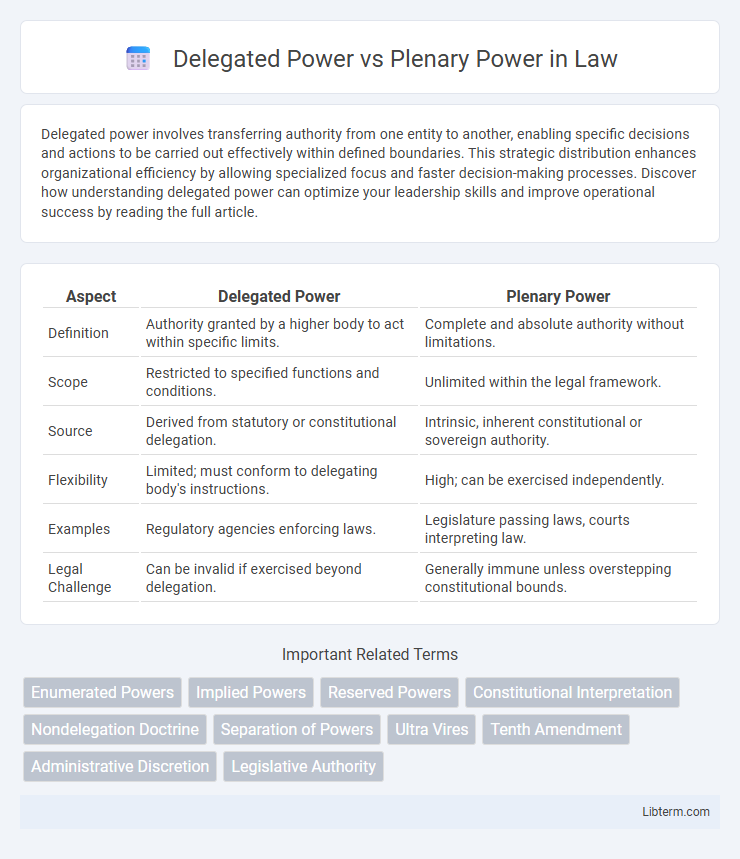Delegated power involves transferring authority from one entity to another, enabling specific decisions and actions to be carried out effectively within defined boundaries. This strategic distribution enhances organizational efficiency by allowing specialized focus and faster decision-making processes. Discover how understanding delegated power can optimize your leadership skills and improve operational success by reading the full article.
Table of Comparison
| Aspect | Delegated Power | Plenary Power |
|---|---|---|
| Definition | Authority granted by a higher body to act within specific limits. | Complete and absolute authority without limitations. |
| Scope | Restricted to specified functions and conditions. | Unlimited within the legal framework. |
| Source | Derived from statutory or constitutional delegation. | Intrinsic, inherent constitutional or sovereign authority. |
| Flexibility | Limited; must conform to delegating body's instructions. | High; can be exercised independently. |
| Examples | Regulatory agencies enforcing laws. | Legislature passing laws, courts interpreting law. |
| Legal Challenge | Can be invalid if exercised beyond delegation. | Generally immune unless overstepping constitutional bounds. |
Understanding Delegated Power: Definition and Examples
Delegated power refers to authority granted by a higher body, such as a legislature, to a subordinate entity to perform specific tasks or make decisions within defined limits. Common examples include administrative agencies empowered to enforce regulations or local governments authorized to manage zoning laws. This delegation ensures efficient governance by allocating decision-making to specialized entities while maintaining overall oversight.
Exploring Plenary Power: Meaning and Scope
Plenary power refers to the complete and absolute authority granted to a governing body or official, allowing them to make decisions without limitations or checks from other entities. This power is often vested in legislative bodies or certain officials, enabling them to enact laws, enforce regulations, or exercise control over specific areas without needing further approval. Understanding plenary power is crucial for analyzing the extent of governmental authority and its impact on legal and administrative actions.
Key Differences Between Delegated and Plenary Power
Delegated power refers to authority granted by a higher body or official to a subordinate entity to perform specific tasks or functions, typically limited in scope and duration. Plenary power denotes full and complete authority over a particular matter, without restrictions or the need for further approval. Key differences include the extent of control, where delegated power is conditional and narrowly defined, while plenary power is broad, unconditional, and comprehensive.
Historical Evolution of Governmental Powers
The historical evolution of governmental powers reveals a shift from delegated power, where authorities exercise only the powers expressly granted by a constitution or higher authority, to plenary power, which involves complete and absolute authority within a given jurisdiction. Early governments predominantly operated under delegated power frameworks to ensure limited government and prevent tyranny, as seen in the development of constitutional monarchies and the U.S. federal system. Over time, plenary power expanded particularly in colonial administrations and emergency governance, reflecting the need for centralized control and adaptability in complex political landscapes.
Legal Foundations of Delegated Power
Delegated power originates from the explicit authorization granted by a legislative body, defining its scope and limitations within statutory or constitutional frameworks. It involves the transfer of specific authority to a subordinate entity or official, ensuring that the exercise of power is confined to the parameters set by the delegating statute. Legal foundations emphasize the necessity of clear grant, purpose, and boundaries to prevent arbitrary or ultra vires actions by the delegatee.
Constitutional Basis for Plenary Power
Plenary power originates from the Constitution, granting entities full authority to act without limitation unless explicitly restricted. It contrasts with delegated power, which is strictly confined to the scope defined by the delegating authority, often limited by statutory or regulatory frameworks. The Constitution implicitly supports plenary powers in areas such as taxation, immigration, and war, where comprehensive government control is deemed essential.
Practical Implications in Governance
Delegated power limits authority by assigning specific tasks or decision-making rights from a higher government body to a subordinate entity, ensuring control and oversight in governance. Plenary power grants broad, unrestricted authority, enabling entities like legislatures to act independently without requiring approval from other bodies. In practice, delegated power requires detailed legal frameworks and monitoring mechanisms, while plenary power facilitates swift decision-making but risks potential overreach without checks and balances.
Case Studies: Delegated vs Plenary Power in Action
In landmark cases such as Immigration and Naturalization Service v. Chadha, the Supreme Court highlighted the boundaries of delegated power by invalidating legislative vetoes, emphasizing the need for clear statutory authorization. Similarly, in Chevron U.S.A., Inc. v. Natural Resources Defense Council, Inc., the Court upheld an agency's interpretation under delegated authority, showcasing plenary power's limitation when agencies act within their congressionally granted scope. These case studies illustrate the delicate balance between congressional delegation and agency autonomy, underscoring the judicial role in delineating the extent of delegated versus plenary power.
Debates and Controversies Surrounding Power Allocation
Debates and controversies surrounding delegated power versus plenary power primarily center on the scope and limits of authority granted to government agencies or officials, with critics arguing that plenary power can lead to unchecked and potentially abusive government action. Proponents of delegated power emphasize the necessity of specific and limited delegation to maintain accountability and prevent overreach, while opponents worry that broad plenary powers undermine democratic principles and separation of powers. Court cases such as Chevron U.S.A., Inc. v. Natural Resources Defense Council highlight ongoing legal challenges and doctrinal disputes over the appropriate balance between these types of power allocation.
Future Trends in the Balance of Governmental Powers
The balance between delegated power and plenary power is shifting as emerging technologies and globalization demand more adaptive governance structures. Governments are increasingly leveraging delegated powers to specialized agencies for faster, expertise-driven decision-making, while debates intensify on preserving plenary power to maintain democratic accountability. Future trends suggest a hybrid approach where digital governance platforms enhance transparency in delegated authorities without eroding legislative supremacy.
Delegated Power Infographic

 libterm.com
libterm.com